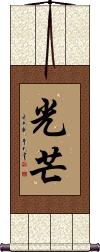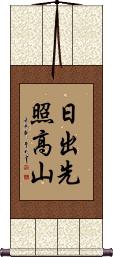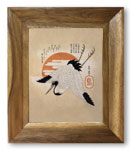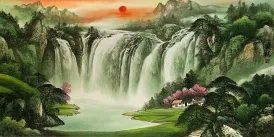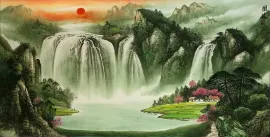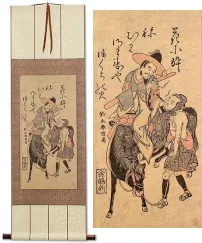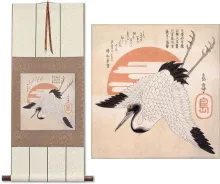Many custom options...
And formats...

The name Sun Light in Chinese / Japanese...
Buy a Sun Light calligraphy wall scroll here!
Personalize your custom “Sun Light” project by clicking the button next to your favorite “Sun Light” title below...
Radiance / Rays of Light
光芒 is the Chinese, Japanese Kanji, and old Korean Hanja for radiance meaning rays of light, brilliant rays, beams of light, etc.
光芒 is the radiance you feel when the sun hits your face in the morning, bringing you warmth while kickstarting your vitamin D production.
When the sun rises it first shines on the highest mountain
This old Buddhist phrase means, “When the sun rises it always shines first on the highest mountain,” or “When the sun appears, it first casts its light upon the highest mountain.”
This comes from the Avatamsaka Sutra and has been used as the name or portion of the name for temples in Japan and sites in China.
The Buddha's first round of teaching (Avatamsaka period) is likened to the time when the sun rises from the east horizon. When the sun first rises it illuminates the high mountains. In this analogy, the high mountains represent the great Bodhisattvas and/or those most ready to receive enlightenment and liberation.
This can be romanized from Japanese as “Nichi shutsu sen shō kō san,” “Nisshutsu saki teru takayama,” or “Hide temazu kōzan wo terasu yama.” The last one is probably the most common. Ask three Japanese people what they think the pronunciation is, and you will get three different opinions.
This in-stock artwork might be what you are looking for, and ships right away...
Gallery Price: $220.00
Your Price: $79.88
Gallery Price: $126.00
Your Price: $69.88
Gallery Price: $61.00
Your Price: $33.88
Gallery Price: $61.00
Your Price: $33.88
Gallery Price: $61.00
Your Price: $33.88
Gallery Price: $61.00
Your Price: $33.88
Gallery Price: $108.00
Your Price: $59.88
Gallery Price: $96.00
Your Price: $52.88
Gallery Price: $72.00
Your Price: $39.88
Not the results for sun light that you were looking for?
Below are some entries from our dictionary that may match your sun light search...
| Characters If shown, 2nd row is Simp. Chinese |
Pronunciation Romanization |
Simple Dictionary Definition |
陽光 阳光 see styles |
yáng guāng yang2 guang1 yang kuang youkou / yoko ようこう |
More info & calligraphy: Sunshinesunshine; sunlight; (female given name) Yōkou The sun's light, also idem陽燄 sun flames, or heat, i.e. the mirage causing the illusion of lakes. |
昀 see styles |
yún yun2 yün |
sun light; used in personal name |
晅 see styles |
xuān xuan1 hsüan |
light of the sun; to dry in the sun |
燧 see styles |
suì sui4 sui hiuchi ひうち |
(bound form) material or tool used to light a fire by means of friction or the sun's rays; (bound form) beacon fire (alarm signal in border regions), esp. one lit during daytime to produce smoke hand drilling (to start a fire); hand drill; (place-name, surname) Hiuchi flame |
鐩 𬭼 see styles |
suì sui4 sui |
(literary) brass mirror used to light a fire by focusing the sun's rays |
五翳 see styles |
wǔ yì wu3 yi4 wu i go ei |
The five films, or interceptors of the light of sun and moon— smoke, cloud dust, fog, and the hands of asuras. |
堕つ see styles |
otsu おつ |
(v2t-k,vi) (1) (archaism) to fall down; to drop; to fall (e.g. rain); to sink (e.g. sun or moon); to fall onto (e.g. light or one's gaze); (2) (archaism) to be omitted; to be missing; (3) (archaism) to crash; to degenerate; to degrade; to fall behind; (4) (archaism) to be removed (e.g. illness, possessing spirit, name on a list); (5) (archaism) to fall (into someone's hands); to become someone's possession; (6) (archaism) to fall; to be defeated; to surrender |
墜つ see styles |
otsu おつ |
(v2t-k,vi) (1) (archaism) to fall down; to drop; to fall (e.g. rain); to sink (e.g. sun or moon); to fall onto (e.g. light or one's gaze); (2) (archaism) to be omitted; to be missing; (3) (archaism) to crash; to degenerate; to degrade; to fall behind; (4) (archaism) to be removed (e.g. illness, possessing spirit, name on a list); (5) (archaism) to fall (into someone's hands); to become someone's possession; (6) (archaism) to fall; to be defeated; to surrender |
夕影 see styles |
yuukage / yukage ゆうかげ |
(1) light of the setting sun; (2) figure lit by the evening sun; (given name) Sekiei |
夕景 see styles |
yuukei; sekkei(ok); sekikei(ok) / yuke; sekke(ok); sekike(ok) ゆうけい; せっけい(ok); せきけい(ok) |
(1) (ゆうけい only) evening; dusk; (2) (See 夕景色) evening scene; evening landscape; (3) (せっけい, せきけい only) (obsolete) light of the setting sun |
大刧 大劫 see styles |
dà jié da4 jie2 ta chieh daikō |
mahākalpa. The great kalpa, from the beginning of a universe till it is destroyed and another begins in its place. It has four kalpas or periods known as vivarta 成刧 the creation period; vivarta‐siddha 住刧 the appearance of sun and moon, i.e. light, and the period of life, human and general; saṃvarta 壤刧 or 滅刧 destruction first by fire, then water, then fire, then deluge, then a great wind, i.e. water during seven small kalpas, fire during 56 and wind one, in all 64; saṃvartatthāhi 増滅刧 total destruction gradually reaching the void. A great kalpa is calculated as eighty small kalpas and to last 1,347,000,000 years. |
慧日 see styles |
huì rì hui4 ri4 hui jih enichi えにち |
{Buddh} sun of wisdom; Buddha's or Bodhisattva's limitless light of wisdom; (given name) Enichi Wisdom-sun, Buddha-wisdom. Huiri, a celebrated Tang monk and author (disciple of Yijing) who also went on pilgrimage to India and spent thirteen years there, died A.D. 748; entitled 慈愍三藏. |
採火 see styles |
saika さいか |
(noun/participle) lighting a sacred flame by the light of the Sun |
當陽 当阳 see styles |
dāng yáng dang1 yang2 tang yang tōyō |
Dangyang, county-level city in Yichang 宜昌[Yi2 chang1], Hubei In the sun, in the light. |
落つ see styles |
otsu おつ |
(v2t-k,vi) (1) (archaism) to fall down; to drop; to fall (e.g. rain); to sink (e.g. sun or moon); to fall onto (e.g. light or one's gaze); (2) (archaism) to be omitted; to be missing; (3) (archaism) to crash; to degenerate; to degrade; to fall behind; (4) (archaism) to be removed (e.g. illness, possessing spirit, name on a list); (5) (archaism) to fall (into someone's hands); to become someone's possession; (6) (archaism) to fall; to be defeated; to surrender |
落る see styles |
ochiru おちる |
(irregular okurigana usage) (v1,vi) (1) to fall down; to drop; to fall (e.g. rain); to sink (e.g. sun or moon); to fall onto (e.g. light or one's gaze); to be used in a certain place (e.g. money); (2) to be omitted; to be missing; (3) to decrease; to sink; (4) to fail (e.g. exam or class); to lose (contest, election, etc.); (5) to crash; to degenerate; to degrade; to fall behind; (6) to become indecent (of a conversation); (7) to be ruined; to go under; (8) to fade; to come out (e.g. a stain); to come off (e.g. makeup); to be removed (e.g. illness, possessing spirit, name on a list); (9) to fall (into someone's hands); to become someone's possession; (10) to fall (into a trap); to fall (for a trick); (11) to give in; to give up; to confess; to flee; (12) to fall; to be defeated; to surrender; (13) to come to (in the end); to end in; (14) to fall (in love, asleep, etc.); (15) to swoon (judo); (16) to consent; to understand; (17) (computer terminology) to crash; to freeze; (18) to die; (19) to move to the depths |
落照 see styles |
rakushou / rakusho らくしょう |
light of the evening sun; setting sun |
迦葉 迦叶 see styles |
jiā shě jia1 she3 chia she kashou / kasho かしょう |
(person) Kasyapa (Hindu sage); Kashou (迦葉波) kāśyapa, 迦攝 (迦攝波) inter alia 'a class of divine beings similar to or equal to prajāpati'; the father 'of gods, demons, men, fish, reptiles, and all animals'; also 'a constellation'. M.W. It is intp. as 'drinking light', i.e. swallowing sun and moon, but without apparent justification. (1) One of the seven or ten ancient Indian sages. (2) Name of a tribe or race. (3) Kāśyapa Buddha, the third of the five buddhas of the present kalpa, the sixth of the seven ancient buddhas. (4) Mahākāśyapa, a brahman of Magadha, who became one of the principal disciples of Śākyamuni, and after his death became leader of the disciples, 'convoked and directed the first synod, whence his title Ārya Sthavira (上坐, lit. chairman) is derived.' Eitel. He is accounted the chief of the ascetics before the enlightenment; the first compiler of the canon and the first patriarch. (5) There were five Kāśyapas, disciples of the Buddha, Mahā-Kāśyapa, Uruvilā-Kāśyapa, Gayā-Kāśyapa, Nadī-Kāśyapa, and Daśabala-Kāśyapa; the second, third, and fourth are said to have been brothers. (6) A bodhisattva, whose name heads a chapter in the Nirvana Sutra. (7) 迦葉摩騰 Kāśyapa-Mātaṅga, the monk who with Gobharana, or Dharmarakṣa, i.e. Zhu Falan 竺法蘭, according to Buddhist statements, brought images and scriptures to China with the commissioners sent by Mingdi, arriving in Luoyang A.D. 67. |
飮光 see styles |
yǐn guāng yin3 guang1 yin kuang |
Drinking light, a tr. of the name of Kāśyapa, v. 迦, or his patronymic, possibly because it is a title of Aruṇa, the charioteer of the sun, but said to be because of Kāśyapa's radiant body. |
餘光 余光 see styles |
yú guāng yu2 guang1 yü kuang |
(out of) the corner of one's eyes; peripheral vision; residual light; light of the setting sun See: 余光 |
墜ちる see styles |
ochiru おちる |
(v1,vi) (1) to fall down; to drop; to fall (e.g. rain); to sink (e.g. sun or moon); to fall onto (e.g. light or one's gaze); to be used in a certain place (e.g. money); (2) to be omitted; to be missing; (3) to decrease; to sink; (4) to fail (e.g. exam or class); to lose (contest, election, etc.); (5) to crash; to degenerate; to degrade; to fall behind; (6) to become indecent (of a conversation); (7) to be ruined; to go under; (8) to fade; to come out (e.g. a stain); to come off (e.g. makeup); to be removed (e.g. illness, possessing spirit, name on a list); (9) to fall (into someone's hands); to become someone's possession; (10) to fall (into a trap); to fall (for a trick); (11) to give in; to give up; to confess; to flee; (12) to fall; to be defeated; to surrender; (13) to come to (in the end); to end in; (14) to fall (in love, asleep, etc.); (15) to swoon (judo); (16) to consent; to understand; (17) (computer terminology) to crash; to freeze; (18) to die; (19) to move to the depths |
摩利支 see styles |
mó lì zhī mo2 li4 zhi1 mo li chih marishi まりし |
{Buddh} Marici (or 摩梨支, or 摩里支); 末利支 Marīci. Rays of light, the sun's rays, said to go before the sun; mirage; also intp. as a wreath. A goddess, independent and sovereign, protectress against all violence and peril. 'In Brahmanic mythology, the personification of light, offspring of Brahmā, parent of Sūrya.' 'Among Chinese Buddhists Maritchi is represented as a female with eight arms, two of which are holding aloft emblems of sun and moon, and worshipped as goddess of light and as the guardian of all nations, whom she protects from the fury of war. She is addressed as 天后 queen of heaven, or as 斗姥 lit. mother of the Southern measure (μλρστζ Sagittarī), and identified with Tchundi' and 'with Mahēśvarī, the wife of Maheśvara, and has therefore the attribute Mātrikā', mother of Buddhas. Eitel. Taoists address her as Queen of Heaven. |
日月暈 日月晕 see styles |
rì yuè yùn ri4 yue4 yun4 jih yüeh yün |
halo; ring of light around the sun or moon |
浴びる see styles |
abiru あびる |
(transitive verb) (1) to dash over oneself (e.g. water); to take (e.g. shower); to bask in (e.g. the sun); to bathe in; to be flooded with (e.g. light); to be covered in; (transitive verb) (2) to suffer (e.g. an attack); to draw (e.g. criticism, attention, praise); to have heaped upon; to be showered with |
落ちる see styles |
ochiru おちる |
(v1,vi) (1) to fall down; to drop; to fall (e.g. rain); to sink (e.g. sun or moon); to fall onto (e.g. light or one's gaze); to be used in a certain place (e.g. money); (2) to be omitted; to be missing; (3) to decrease; to sink; (4) to fail (e.g. exam or class); to lose (contest, election, etc.); (5) to crash; to degenerate; to degrade; to fall behind; (6) to become indecent (of a conversation); (7) to be ruined; to go under; (8) to fade; to come out (e.g. a stain); to come off (e.g. makeup); to be removed (e.g. illness, possessing spirit, name on a list); (9) to fall (into someone's hands); to become someone's possession; (10) to fall (into a trap); to fall (for a trick); (11) to give in; to give up; to confess; to flee; (12) to fall; to be defeated; to surrender; (13) to come to (in the end); to end in; (14) to fall (in love, asleep, etc.); (15) to swoon (judo); (16) to consent; to understand; (17) (computer terminology) to crash; to freeze; (18) to die; (19) to move to the depths |
阿彌陀 阿弥陀 see styles |
ā mí tuó a1 mi2 tuo2 a mi t`o a mi to Amida あみだ |
(out-dated kanji) (1) (Buddhist term) Amitabha (Buddha); Amida; (2) (kana only) (abbreviation) ghostleg lottery; ladder lottery; lottery in which participants trace a line across a lattice pattern to determine the winner; (3) (kana only) (abbreviation) wearing a hat pushed back on one's head (阿彌) amita, boundless, infinite; tr. by 無量 immeasurable. The Buddha of infinite qualities, known as 阿彌陀婆 (or 阿彌陀佛) Amitābha, tr. 無量光 boundless light; 阿彌陀廋斯Amitāyus, tr. 無量壽 boundless age, or life; and among the esoteric sects Amṛta 甘露 (甘露王) sweet-dew (king). An imaginary being unknown to ancient Buddhism, possibly of Persian or Iranian origin, who has eclipsed the historical Buddha in becoming the most popular divinity in the Mahāyāna pantheon. His name indicates an idealization rather than an historic personality, the idea of eternal light and life. The origin and date of the concept are unknown, but he has always been associated with the west, where in his Paradise, Suikhāvatī, the Western Pure Land, he receives to unbounded happiness all who call upon his name (cf. the Pure Lands 淨土 of Maitreya and Akṣobhya). This is consequent on his forty-eight vows, especially the eighteenth, in which he vows to refuse Buddhahood until he has saved all living beings to his Paradise, except those who had committed the five unpardonable sins, or were guilty of blasphemy against the Faith. While his Paradise is theoretically only a stage on the way to rebirth in the final joys of nirvana, it is popularly considered as the final resting-place of those who cry na-mo a-mi-to-fo, or blessed be, or adoration to, Amita Buddha. The 淨土 Pure-land (Jap. Jōdo) sect is especially devoted to this cult, which arises chiefly out of the Sukhāvatīvyūha, but Amita is referred to in many other texts and recognized, with differing interpretations and emphasis, by the other sects. Eitel attributes the first preaching of the dogma to 'a priest from Tokhara' in A. D.147, and says that Faxian and Xuanzang make no mention of the cult. But the Chinese pilgrim 慧日Huiri says he found it prevalent in India 702-719. The first translation of the Amitāyus Sutra, circa A.D. 223-253, had disappeared when the Kaiyuan catalogue was compiled A.D. 730. The eighteenth vow occurs in the tr. by Dharmarakṣa A.D. 308. With Amita is closely associated Avalokiteśvara, who is also considered as his incarnation, and appears crowned with, or bearing the image of Amita. In the trinity of Amita, Avalokiteśvara appears on his left and Mahāsthāmaprāpta on his right. Another group, of five, includes Kṣitigarbha and Nāgārjuna, the latter counted as the second patriarch of the Pure Land sect. One who calls on the name of Amitābha is styled 阿彌陀聖 a saint of Amitābha. Amitābha is one of the Five 'dhyāni buddhas' 五佛, q.v. He has many titles, amongst which are the following twelve relating to him as Buddha of light, also his title of eternal life: 無量光佛Buddha of boundless light; 無邊光佛 Buddha of unlimited light; 無礙光佛 Buddha of irresistible light; 無對光佛 Buddha of incomparable light; 燄王光佛 Buddha of yama or flame-king light; 淸淨光佛 Buddha of pure light; 歡喜光佛 Buddha of joyous light; 智慧光佛 Buddha of wisdom light; 不斷光佛 Buddha of unending light; 難思光佛 Buddha of inconceivable light; 無稱光佛Buddha of indescribable light; 超日月光佛 Buddha of light surpassing that of sun and moon; 無量壽 Buddha of boundless age. As buddha he has, of course, all the attributes of a buddha, including the trikāya, or 法報化身, about which in re Amita there are differences of opinion in the various schools. His esoteric germ-letter is hrīḥ, and he has specific manual-signs. Cf. 阿彌陀經, of which with commentaries there are numerous editions. |
三種光明 三种光明 see styles |
sān zhǒng guāng míng san1 zhong3 guang1 ming2 san chung kuang ming sanshu kōmyō |
The three kinds of light: (a) extemal— sun, moon, stars, lamps, etc.; (b) dharma, or the light of right teaching and conduct; (c) the effulgence or bodily halo emitted by Buddhas, bodhisattvas, devas. |
十二光佛 see styles |
shí èr guāng fó shi2 er4 guang1 fo2 shih erh kuang fo jūni kōbutsu |
Amitābha's twelve titles of light. The無量壽經上 gives them as 無量光佛, etc., i.e. the Buddha of light that is immeasurable boundless, irresistible, incomparable, yama (or flaming), pure, joy, wisdom, unceasing, surpassing thought, ineffable, surpassing sun and moon. Another list is given in the 九品往生阿彌陀...經. |
太陽光圧 see styles |
taiyoukouatsu / taiyokoatsu たいようこうあつ |
(See 光圧) light pressure (from the sun) |
寶光天子 宝光天子 see styles |
bǎo guāng tiān zǐ bao3 guang1 tian1 zi3 pao kuang t`ien tzu pao kuang tien tzu Hōkō Tenshi |
Precious light deva, Sūrya-deva, the sun-prince, a manifestation of Guanyin. |
Click here for more sun light results from our dictionary
The following table may be helpful for those studying Chinese or Japanese...
| Title | Characters | Romaji (Romanized Japanese) | Various forms of Romanized Chinese | |
| Radiance Rays of Light | 光芒 | koubou / kobo | guāng máng guang1 mang2 guang mang guangmang | kuang mang kuangmang |
| When the sun rises it first shines on the highest mountain | 日出先照高山 | hiide temazu kousan wo terasu yama hide temazu kosan wo terasu yama | rì chū xiān zhào gāo shān ri4 chu1 xian1 zhao4 gao1 shan1 ri chu xian zhao gao shan richuxianzhaogaoshan | jih ch`u hsien chao kao shan jihchuhsienchaokaoshan jih chu hsien chao kao shan |
Successful Chinese Character and Japanese Kanji calligraphy searches within the last few hours...
